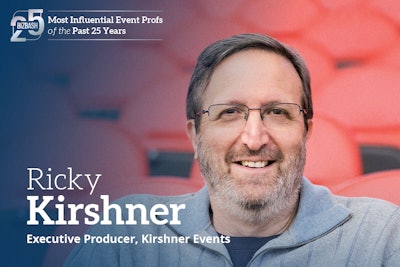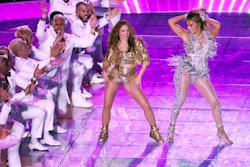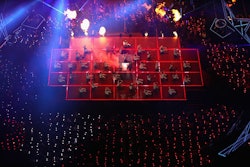
Ricky Kirshner is one of the entertainment industry’s most accomplished event producers, with a career spanning decades of high-profile television specials, political conventions, and cultural milestones. As the founder of New York–based Kirshner Events, he’s the creative force behind some of the most widely viewed broadcasts in the world—including the Tony Awards, the Super Bowl halftime show, and nearly every Democratic National Convention since 1992. He’s also produced presidential inauguration events for Barack Obama and Joe Biden, along with the Kennedy Center Honors and other major national moments.
A former member of the Presidential Committee on the Arts and Humanities, Kirshner began his career at ABC News before moving into special events and joining the team at Radio City Music Hall. Over the years, he’s built a reputation for producing large-scale live events that are both technically seamless and emotionally resonant—earning nine Emmy Awards, a Peabody, and an Edward R. Murrow Award along the way.
How his role has evolved—and stayed consistent—over the past 25 years:
"What has evolved is that many clients now have events divisions and sometimes you are hired to implement their vision. Therefore, we have much more interaction with clients and a feeling sometimes of producing by committee, which actually is not a good evolution. You should want to hire a producer that has a creative vision and implements that vision on time and on budget. Of course, there is interaction with the client on messaging, marketing, etc.
What is consistent is that this is still a team sport. No one produces an event alone, and if you don’t have a great team with you, you will not produce the best events."  Kirshner first got involved in the Tony Awards in 1993 as a line producer.Photo: Courtesy of Kirshner Events
Kirshner first got involved in the Tony Awards in 1993 as a line producer.Photo: Courtesy of Kirshner Events
What trends/tech have had the biggest impact on events today:
"There are so many technological changes over the last 25 years. Visuals used to be projected using large Barco gear, etc. Then, we had 35 mil LED screens, and we thought that was the new cool thing. We are now down to one and two mil LED that is light and easy to hang. Twenty-five years ago, we had standard-def video. We went to 16:9 and HD and 4K and 8K and 3D, and who knows where it all ends!
But the biggest impact is the internet and social media. Everyone is looking for 'likes.' There is instant feedback—clients expect immediate responses, and so the production process is sped up and sometimes impacted by outside forces."
Advice for his younger self:
"When I started, there were no classes or courses that I knew of that prepared you to produce events. I started in news, and through some twists and turns, started producing events. If I knew this is where I would be, I might have taken some technical classes or music classes. I do have an accounting degree, and I think any business course is very useful to understand budgets and to eventually run your own business."  From 2007 through 2020, Kirshner acted as executive producer of the Super Bowl halftime show.Photo: Courtesy of Kirshner Events
From 2007 through 2020, Kirshner acted as executive producer of the Super Bowl halftime show.Photo: Courtesy of Kirshner Events
An event he'll never forget:
"I have been fortunate to have produced some of the most well-known events and TV programs of the last 25 years. From Super Bowl halftimes to presidential inaugurals and many more. The most memorable would have to be the 2008 Democratic National Convention. It was the first National Convention in a football stadium, and the crowd that night was electric. We also had less than two months to plan and produce that event, and we were simultaneously producing the first three nights of the convention nearby in an arena. When the fireworks went off at the end of the night, it was a week like no other. I don’t think any other team could have pulled it off as successfully, and propelled Barack Obama to the presidency."
What he hopes his legacy will be:
"I want my legacy to be that I produced many high-profile events under extreme pressure while still treating everyone with respect and decency. Too many times, you hear stories about outrageous behavior. We have been very focused on not being a place that allowed for that. You need people to have an environment in which they are not afraid to make a mistake. I hope the people who have worked for me over the years take that forward and continue to treat their teams in the same way."
What excites him most about where the industry is headed:
"This is a hard question because I think most people would say technology or some equipment-based idea. To me, the focus should be on telling the story and getting the message across. So I hope that the events industry remembers that no matter what technological advances we have, don’t forget why we are there in the first place.
It is also exciting that many colleges and schools now have courses that teach events. There are so many different ways to define events—from TV shows to experiential activations to conferences—which means there are more opportunities for young, smart people to get into the business and make an impact."
Back to the full list
This feature is sponsored by Convene, a global hospitality company that manages a growing portfolio of brands that design and operate premium event venues, meeting spaces, and flexible office.



















